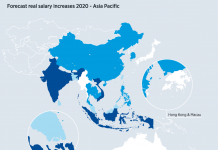Randstad has released the results of a survey they conducted which provides telling information about the regional HR landscape. According to 34 per cent of survey respondents based in Malaysia, performance reviews are only conducted once a year. The numbers are even higher in Singapore with 47 per cent of respondents conducting performance reviews annually. Close to nine in 10 employees (89 per cent) said that their work performance is still being graded against a perfect score.
The survey also shows that real-time feedback is garnering favour among employers and employees. It provides employees with a chance to ask for new growth opportunities as they present themselves, or raise any red concerns before it gets out of hand.
In Malaysia, 73 per cent of the employers have made use of real-time feedback to monitor work productivity and to share and receive criticism which they can use to improve and address issues. This is compared to 49 per cent of companies in Singapore and 57 per cent in Asia Pacific as a whole.
Eight in 10 employees (80 per cent) said that they feel comfortable in giving and receiving feedback to their managers. 84 per cent said that they work in an open environment where feedback can be shared with each other, including their managers, at any time.
Despite working in an environment where real-time feedback is encouraged, 93 per cent of respondents still feel that performance review is a session that is used by the manager to give them feedback. In fact, 8 per cent of respondents felt that they do not have the opportunity to speak out about their career aspirations or concerns at work.
Feedback channel results:
- Face-to-face: 57 per cent
- Online Survey: 19 per cent
- In Writing on Paper: 15 per cent
- Employees are not Asked for Feedback: 8 per cent
- Others: 1 per cent
Emotions are still mixed with regards towards both real-time feedback and scheduled job performance reviews.
Among the positive responses, employees believe that feedback:
- helps them have a clear understanding of what they need to achieve and how to do it (69 per cent)
- makes them feel more motivated (52 per cent)
- supports learning and development (49 per cent)
However, those who are reluctant to receive or provide feedback state that they:
- do not know how to react (34 per cent)
- feel uncomfortable (33 per cent)
- find it hard to not take negative feedback personally (29 per cent)
The feedback that is shared between colleagues does not always have to be about criticism and improvement; it can also be recognising someone for their good work or achievements. The balance between sharing positive and negative feedback helps point the employees in the right direction of growth. It motivates them to be more productive and collaborative and instils employee loyalty.
32 per cent of respondents worldwide said that their managers review their performance only once a year. In Malaysia, 34 per cent of respondents said that they still have regular annual performance reviews.
How often are performance reviews conducted?
Malaysia
Yearly: 34 per cent
Half-yearly: 17 per cent
Quarterly: 15 per cent
Monthly: 22 per cent
Weekly: 6 per cent
Never: 6 per cent
Singapore
Yearly: 47 per cent
Half-yearly: 19 per cent
Quarterly: 15 per cent
Monthly: 8 per cent
Weekly: 3 per cent
Never: 8 per cent
Asia Pacific
Yearly: 31 per cent
Half-yearly: 17 per cent
Quarterly: 18 per cent
Monthly: 16 per cent
Weekly: 5 per cent
Never: 13 per cent
The survey also states that around 72 per cent of Singaporean employees are comfortable with providing feedback to their managers. 80 per cent are able to have an open conversation with their manager. 88 per cent of employees see performance reviews as a session to receive feedback; a slightly lower number than Malaysia, but still quite high.
However, the results also show that Singaporean employees are less inclined to provide their colleagues with feedback at any time (73 per cent). They are also less likely to provide managers with feedback outside of performance reviews (67 per cent).






















